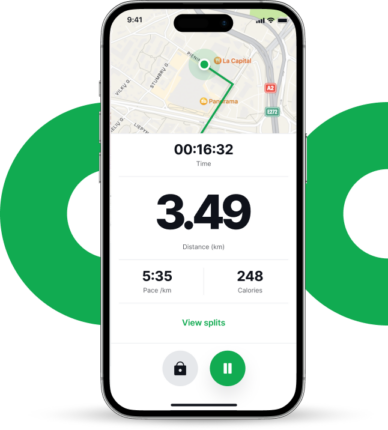Do runners need supplements? Or is it all just marketing hype?
You can get all the nutrients you need to be a great runner through a careful diet. But it’s not always possible to stick to a healthy diet—work, stress, and other factors can get in the way. And let’s not forget that nutrient absorption varies from runner to runner.
Supplements can be a valuable addition to your runner’s life during training and before and after events. Not just any supplements, but those scientifically proven to benefit endurance athletes.
The right mix of nutrients can also double as weight loss supplements, helping you shed extra pounds while improving your running time.
Do you want to get even faster? Speed up recovery time? Increase your stamina and build muscle?
Some nutrients are more important for runners than others. Looking past the marketing claims at the scientific evidence behind running nutrition will help you get the most out of supplements for runners without side effects.
In This Article:
Why Use Running Supplements?
When you consider supplements, it’s normal to have a lot of questions like…
Do supplements for runners actually work? Should runners take joint supplements? Can supplements reduce inflammation, help with workout recovery, and improve sleep, as some claim?
And it’s totally okay to be on the fence about it. Because there are a lot of claims out there.
But there’s also a lot of science backing runners supplements, including the NIH’s fact sheet on Dietary Supplements for Exercise and Athletic Performance. But as we’ll see, more is not always better.
For example, too much Vitamin C won’t directly improve performance but may cause runner’s trots, cramps, nausea, and other side effects.
The short of it is that runners supplements have real benefits. They help your body better absorb nutrients, promote a speedy recovery, and may even prevent runner’s trots.
Running and nutrition are closely linked. Like all athletes, runners who care about their performance value their nutrition too. If you’re more likely to speed past McDonald’s than stop for a burger, you’re one of them. And that means adding runners supplements to your to-do list.
So, what runners supplements actually work?
Supplements for Runners You Should Consider
IAAF guidelines for athletic nutrition make it clear that runners have special nutritional requirements, including a higher daily protein intake compared to the general adult population.
But it’s not a question of loading yourself with generic supplements. Also, IAAF guidelines stress that performance improvements differ for each supplement and individual.
For example, while caffeine and nitrate/beetroot juice may marginally improve performance across all types of running including marathons and half-marathons, beta-alanine and bicarbonate seem to offer little improvement for endurance races.
Where does this leave you?
Only those supplements for runners that are carefully formulated with scientific sports nutrition guidelines in mind pack minerals that your body can actually benefit from.
Next, let’s explore what goes into the best runners supplements for weight loss, recovery, and endurance. Taking these regularly will improve your athletic performance while helping you burn fat and build muscle.
Vitamin D
According to the NIH Vitamin Dietary Supplement Fact Sheet, Vitamin D3 (calciferol) or “the sunshine vitamin” is not likely to increase your running performance. But it’s essential for bone health.
Running puts pressure on your leg bones, increasing the risk for stress fractures. Vitamin D3 deficiency may particularly affect female long-distance runners, possibly increasing the risk for osteopenia and osteoporosis.
Vitamin D3 tops the list of vitamins female athletes should take.
Protein
Is protein supplementation necessary if you’re eating meat and a protein-rich diet? It depends on how many proteins you’re taking in, and their type.
Protein helps your body recover after running. It’s crucial for building and maintaining the lean muscle that you need to run at your best. Dietary protein can also aid with weight loss by increasing satiety and optimizing energy expenditure.
Keep in mind that your running mileage increases your protein requirements, which can make it challenging to get enough healthy dietary protein from your diet.
According to IAAF guidelines, while 1.3-1.7g/kg BM/day of protein is optimal, anything above 2.5 g/kg/BM/day “offers no adaptive advantage.”
It’s also important to remember the strengths of each type of protein. Take whey and casein, both of which are found in milk.
Whey protein acts faster on protein synthesis than casein or soy, making it a safe choice for quick protein replenishment and recovery after intense training.
Casein is digested more slowly, reducing the protein breakdown rate in your body and supplying your muscle cells with a steady supply of amino acids. This makes casein very effective for muscle growth and long-term recovery.
Collagen powder is another supplement you may want to consider. Collagen, which makes up about 1/3 of your total body protein, maintains your body’s mobility and flexibility and can protect joints and soft tissues.
So, to sum up: protein is good for runners, but you have to watch your doses.
What about protein shakes? Is it good to drink protein shakes after running? Yes. Protein shakes give your body amino acids from which to rebuild proteins.
What’s more, studies show that polyphenol-enriched protein powder can protect your body from virus and bacteria infection after intensive training, when the risk for Escherichia coli or Staphylococcus aureus infections is higher than normal.
Omega-3
Omega-3 fatty acids are anti-inflammatory, making them an important recovery supplement for runners. At the same time, Omega-3 fatty acids can protect against airway inflammation caused by high-fat meals. Keeping your lungs healthy is crucial to being a fast runner, and these healthy fats help with that.
Not sure which to choose between fish oil or Krill oil? Studies suggest that krill oil has more antioxidants and is better absorbed by the body. But fish oil is more affordable and widely available. At the end of the day, both are good sources of Omega-3.
If you’re vegetarian or vegan, flaxseed oil is another rich source of Omega-3 fatty acids and is good for gastrointestinal health too.
Iron
Red blood cells transport oxygen to your muscles and lungs, and iron helps the body make them.
When you run, you lose iron through sweat, the intestines, as well as when your feet strike the ground, which damages red blood cells in the feet.
Female runners also lose iron during menstruation. Runner’s Anemia caused by iron deficiency affects predominantly female long-distance runners, though it can affect males as well.
Symptoms include fatigue, nausea, and shortness of breath. Running with runner’s anemia can significantly lower your performance. Iron then is a must-have runners supplement.
Electrolytes
Whether you’re training or competing, you lose electrolytes through sweat. As a result, you may get cramps because the muscle cells won’t be able to properly control muscle contraction.
Electrolytes include essential minerals such as magnesium, calcium, sodium, potassium, bicarbonate, and zinc. You want to add these to your list of key runners supplements.
You can tap into the performance-boosting effects of sodium bicarbonate by taking it up to 3 hours before you exercise in a dose of up to 300mg/kg. But note that effects can vary from individual to individual. You won’t know whether it works for you until you try it.
Nitrate
Another compound that may enhance your performance is dietary nitrate.
Your body transforms nitrate into nitric oxide, which may improve blood flow, reduce blood pressure, and boost stamina and performance.
Beetroot, a rich source of nitrate, can be good for buffering the acids that intense training creates in the body.
Caffeine
Caffeine is great for energy and a key constituent of most fat burn supplements. As it turns out, it’s also a smart choice as a runners supplement.
Caffeine increase running performance while also reducing the perception of pain in the lower legs. It can keep you going for longer.
A dose of 4 mg caffeine/kg may improve your athletic performance. That said, the effect of caffeine on endurance performance may depend on your genotype, and specifically, on the CYP1A2 gene affecting caffeine metabolism.
Time your runs before and after taking a caffeine supplement to best gauge its effect on your body.
Probiotics
Probiotics are beneficial bacteria that promote gut health. The gut-brain connection works two ways—an unhealthy intestine can cause stress, anxiety, and depression, all of which can affect your running performance.
In addition, probiotics may have specific benefits for runners. Intensive exercise causes mild damage to the cells lining the intestinal wall, which can lead to leaky gut syndrome, which is as unpleasant as it sounds.
There’s solid evidence that taking a probiotic for 14 weeks reduces gastrointestinal problems.
BCAAs (Branched Chain Amino Acids)
BCAAs are essential amino acids that your body needs to build muscle, transport nutrients, and carry out other essential functions. When doing resistance training, taking a BCAAs supplement increases muscle strength, muscle mass, and promotes fat loss.
What’s more, it can reduce low-to-moderate muscle damage caused by training—provided you take it before training!
To get the most out of BCAAs, you need a daily intake of over 200 mg /kg for at least 10 days.
Glutamine
Another amino acid, glutamine plays an important role in the immune system, protein building, and gut health. Glutamine is sometimes marketed as a muscle gain supplement, but there’s just not enough evidence to support that claim.
On the other hand, studies show it can reduce muscle soreness and fatigue during running, making it one of the more important recovery supplements.
L-Carnitine
L-Carnitine occurs naturally in our bodies, where it helps turn fat into energy. Almost all of it is stored in muscles.
You may have also come across Acetyl L-Carnitine. What’s the difference between L-Carnitine and Acetyl L-Carnitine? Acetyl L-Carnitine is another type of Carnitine that is better absorbed in the gut.
L-Carnitine is often part of fat burner supplements and promoted for its weight loss functions and as an exercise performance enhancer.
Long-term use of L-Carnitine may also speed up exercise recovery and improve the supply of oxygen to your muscles.
Vitamin C
Vitamin C significantly improves iron absorption, making it a key aid in preventing iron deficiency, a condition which we’ve seen may affect especially women runners.
At the same time, Vitamin C is essential for wound healing in the body, and could help you heal from injuries you incur during training. If you’re training for a long-distance run over several months, injuries can be hard to avoid, so keep an eye on your Vitamin C intake.
Also, this vitamin is a strong immune booster that can help reduce the risk for infections after intensive training.
Creatine
Last but not least among recovery supplements is creatine, which occurs naturally in muscle cells. Creatine is a popular supplement commonly taken for gaining muscle mass.
It can also help you recover faster after training. Creatine works by boosting your muscles’ energy and promoting muscle growth through changes in cell function.
Key Takeaways – An Individual Approach to Running Supplements
- Science makes it clear—supplements for runners can actually work.
- Nutrients like proteins, vitamins, minerals, and amino acids are essential for runners to maintain their health and improve their performance.
- Other items like probiotics and caffeine are also helpful for runners.
- However, what supplements one needs and in what quantity may vary depending on individual needs and goals. It’s always best to consult a healthcare professional before taking any supplements.














